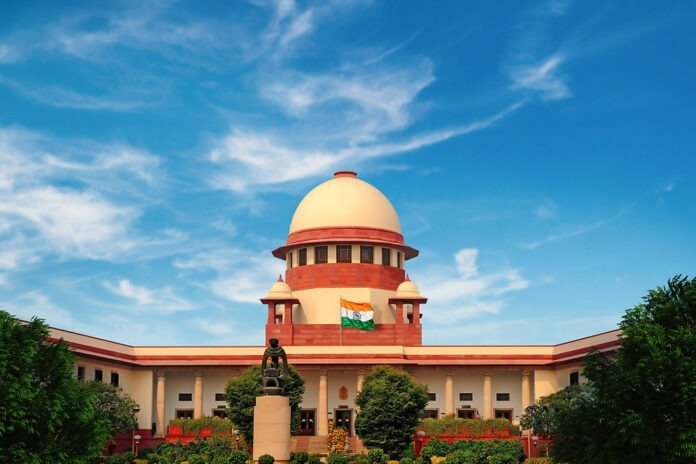The Supreme Court will examine key questions on Rohingyas’ legal status and rights, including refugee recognition and deportation obligations.
Subheading:
The apex court lays down two fundamental questions that may reshape India’s refugee and deportation framework amid the Rohingya crisis.
In a development poised to influence India’s approach to refugee jurisprudence, the Supreme Court of India on Tuesday highlighted two pivotal legal questions concerning the rights, recognition, and treatment of Rohingya refugees currently residing in the country. The case, which has sparked both political debate and humanitarian concern, comes at a time when issues of illegal immigration and national security remain central to the government’s legal strategy.
A three-judge bench comprising Justices Surya Kant, Dipankar Datta, and N Kotiswar Singh framed the issues as follows in its order:
(i) Whether Rohingyas are entitled to be declared as refugees and, if so, what protections flow from such a declaration?
(ii) If Rohingyas are classified as illegal entrants, are the Union Government and respective State Governments duty-bound to deport them in accordance with law?
This judicial scrutiny brings renewed focus to India’s policy vacuum on refugees, as the country remains non-signatory to the 1951 Refugee Convention and its 1967 Protocol, relying instead on ad hoc administrative mechanisms.
Legal Ambiguity: Refugees vs. Illegal Migrants
The Rohingya, a persecuted Muslim minority from Myanmar’s Rakhine State, have fled to multiple countries—including Bangladesh and India—after violent crackdowns by the Myanmar military. In India, estimates suggest that around 40,000 Rohingyas have taken refuge, with many settled in Jammu, Hyderabad, Delhi, and Mewat.
However, India officially categorises them as “illegal migrants” under the Foreigners Act, 1946, which allows for their arrest, detention, and deportation. The current case may well test the limits of this classification, particularly in light of Article 21 of the Constitution, which guarantees right to life and liberty to all persons, not just citizens.
Advocate Prashant Bhushan, representing a petitioner supporting the Rohingyas’ right to remain, has argued that even undocumented individuals fleeing persecution are entitled to constitutional protection under international customary law and humanitarian principles.
Government counsel, however, maintains that national security considerations must override such concerns, especially when there are intelligence inputs regarding radicalisation within refugee settlements.
Can Detention Be Indefinite?
One of the most pressing humanitarian concerns in this case is the detention of Rohingyas, especially those held in makeshift camps or foreigner detention centres for years without trial or repatriation.
During the hearing, the bench sought clarity on whether such indefinite detention without deportation violates fundamental rights under Article 21 and the principle of non-refoulement—a cornerstone of international refugee law that prohibits returning asylum seekers to countries where they face danger.
While India is not legally bound by the Refugee Convention, the Supreme Court in past rulings has recognised that non-refoulement may be part of customary international law, which forms part of domestic jurisprudence unless contrary legislation exists.
A Broader Constitutional Question
The case presents not just a refugee rights issue but a larger constitutional dilemma: How should India balance sovereign immigration control with humanitarian obligations?
Legal scholars are watching closely. “This case offers the Supreme Court an opportunity to establish guiding principles on the treatment of refugees under Indian law, in the absence of a formal refugee statute,” says Dr. Anil Prakash, Professor of Constitutional Law at Jindal Global Law School.
In 2021, the apex court had allowed the deportation of Rohingyas from Jammu, but also observed that refugees cannot be summarily expelled without due process. That duality now returns to the courtroom for fuller examination.
State-Level Response and Political Ramifications
Some states like Assam and Jammu & Kashmir have taken hardline positions on the presence of Rohingyas, citing demographic concerns and alleged links to cross-border terrorism. Others have sought a more measured approach, pending a national refugee policy.
The Union Government, meanwhile, has reiterated that only individuals recognised as refugees by the United Nations High Commissioner for Refugees (UNHCR) or cleared by the Ministry of Home Affairs are considered for asylum. Yet, the process remains opaque and riddled with inconsistencies.
This legal uncertainty has left thousands of Rohingya families in limbo—living in precarious conditions without access to formal education, healthcare, or legal redress.
Next Steps in the Court
The Supreme Court is now expected to hear substantive arguments on the above issues in the coming weeks. Petitioners have been directed to file written submissions clarifying their legal stance, while the Centre has been asked to detail the current policy framework, if any, regarding the categorisation and treatment of Rohingyas.
In the meantime, legal observers note that the judgment, whenever delivered, could have far-reaching implications for India’s immigration policy, especially amid ongoing debates over the Citizenship Amendment Act (CAA) and the National Register of Citizens (NRC).
For continuing coverage and updates, readers can follow our National News section or explore expert Insight on refugee jurisprudence.
External Link:
Watch expert discussions and updates on this case on The Legal Observer YouTube Channel




